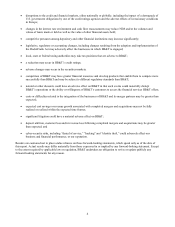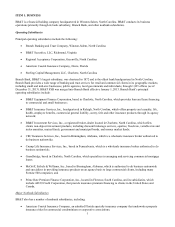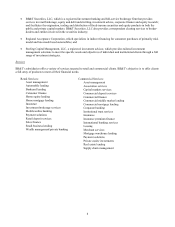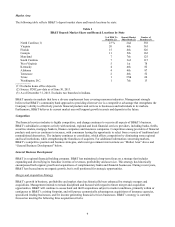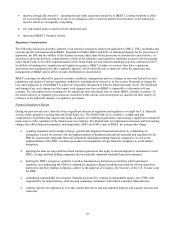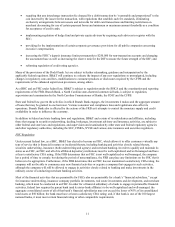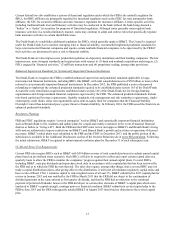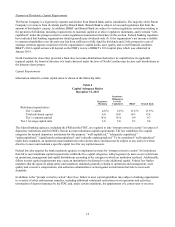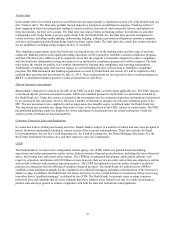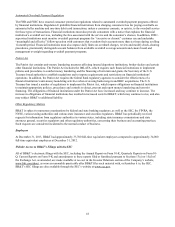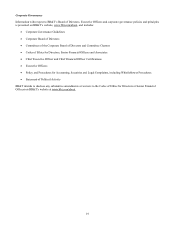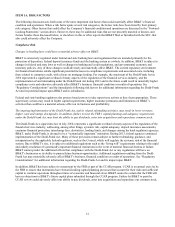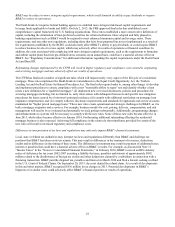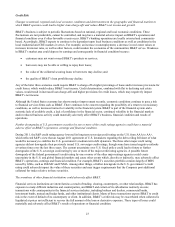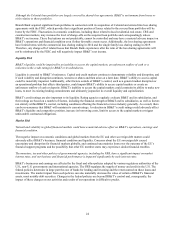BB&T 2013 Annual Report Download - page 16
Download and view the complete annual report
Please find page 16 of the 2013 BB&T annual report below. You can navigate through the pages in the report by either clicking on the pages listed below, or by using the keyword search tool below to find specific information within the annual report.
16
Volcker Rule
In December 2010, five federal agencies issued final rules developed jointly to implement section 619 of the Dodd-Frank Act
(the "Volcker rule"). The final rules prohibit insured depository institutions and affiliated companies ("banking entities")
from engaging in short-term proprietary trading of certain securities, derivatives, and commodity futures, and options on
these instruments, for their own account. The final rules also impose limits on banking entities' investments in, and other
relationships with, hedge funds or private equity funds. Like the Dodd-Frank Act, the final rules provide exemptions for
certain activities, including market making, underwriting, hedging, trading in government obligations, insurance company
activities, and organizing and offering hedge funds or private equity funds. The final rules also clarify that certain activities
are not prohibited, including acting as agent, broker, or custodian.
The compliance requirements under the final rules vary based on the size of the banking entity and the scope of activities
conducted. Banking entities with significant trading operations will be required to establish a detailed compliance program,
and their Chief Executive Officers will be required to attest that the program is reasonably designed to achieve compliance
with the final rules. Independent testing and analysis of an institution's compliance program also will be required. The final
rules reduce the burden on smaller, less-complex institutions by limiting their compliance and reporting requirements.
Additionally, a banking entity that does not engage in covered trading activities will not need to establish a compliance
program. The FRB announced that banking organizations covered by Dodd-Frank Act section 619 will be required to fully
conform their activities and investments by July 21, 2015. These requirements are not expected to have a material impact on
BB&T’s consolidated financial position, results of operations or cash flows.
Deposit Insurance Assessments
Branch Bank’s deposits are insured by the DIF of the FDIC up to the limits set forth under applicable law. The FDIC imposes
a risk-based deposit premium assessment system, which was amended pursuant to the Reform Act and further amended by
the Dodd-Frank Act. Under this system, as amended, the assessment rates for an insured depository institution are determined
by an assessment rate calculator, which is based on a number of elements to measure the risk each institution poses to the
DIF. The new assessment rate is applied to total average assets less tangible equity, as defined under the Dodd-Frank Act.
The assessment rate schedule can change from time to time, at the discretion of the FDIC, subject to certain limits. The FDIC
has published guidelines under the Reform Act on the adjustment of assessment rates for certain institutions. Under the
current system, premiums are assessed quarterly.
Consumer Protection Laws and Regulations
In connection with its lending and leasing activities, Branch Bank is subject to a number of federal and state laws designed to
protect borrowers and promote lending to various sectors of the economy and population. These laws include the Equal
Credit Opportunity Act, the Fair Credit Reporting Act, the Truth in Lending Act, the Home Mortgage Disclosure Act, the
Real Estate Settlement Procedures Act, and their respective state law counterparts.
CFPB
The Dodd-Frank Act created a new, independent federal agency, the CFPB, which was granted broad rulemaking,
supervisory and enforcement powers under various federal consumer financial protection laws, including the laws referenced
above, fair lending laws and certain other statutes. The CFPB has examination and primary enforcement authority with
respect to depository institutions with $10 billion or more in assets, their service providers and certain non-depository entities
such as debt collectors and consumer reporting agencies. The CFPB has authority to prevent unfair, deceptive or abusive
practices in connection with the offering of consumer financial products. The Dodd-Frank Act authorizes the CFPB to
establish certain minimum standards for the origination of residential mortgages including a determination of the borrower’s
ability to repay. In addition, the Dodd-Frank Act allows borrowers to raise certain defenses to foreclosure if they receive any
loan other than a “qualified mortgage” as defined by the CFPB. The Dodd-Frank Act permits states to adopt consumer
protection laws and standards that are more stringent than those adopted at the federal level and, in certain circumstances,
permits state attorneys general to enforce compliance with both the state and federal laws and regulations.


